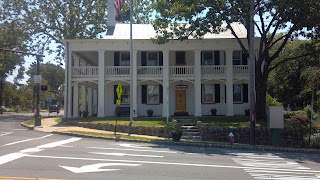I have to admit to being a bit confused when I discovered that George Washington lived in Mendham.
I stumbled on this fact during yet another aimless drive through Morris County, accompanied by the WPA Guide to 1930s New Jersey. Finding myself in Mendham I flipped through a few pages of the manual to discover that somewhere along County Road 510, the Old Route 24, "An overgrowth of tall trees and thickets... hides from the road the Estate of George Washington, coffee manufacturer." Or at least it did in 1938.
That certainly got me curious. Thing is, the connection between the Father of our Country, coffee and Mendham wasn't that clear to me. While wintering in Morristown, did General Washington have a little hideaway, just a few miles distant, where he discovered the secrets of a good cuppa joe in his spare time? The Ford Mansion may have been the Pentagon of the Revolution, but I'd never heard Mendham referred to as the Coffee Pot of the Revolution.
Okay, I'm having a bit of fun, but there indeed was a George Washington who lived in New Jersey in the 20th century and ran an eponymous coffee company in Morris Plains.
 The java-loving Washington was an Anglo-Belgian chemist who immigrated to the United States with his wife in the 1890s. An unsuccessful businessman -- he tried selling kerosene lamp mantles and cameras for a time -- he eventually attempted cattle ranching in Guatemala. It was there that inspiration struck.
The java-loving Washington was an Anglo-Belgian chemist who immigrated to the United States with his wife in the 1890s. An unsuccessful businessman -- he tried selling kerosene lamp mantles and cameras for a time -- he eventually attempted cattle ranching in Guatemala. It was there that inspiration struck.
As the story goes, one day as he was waiting for his coffee to brew, he noticed a residue forming on the spout of the pot. Curious about the substance, he began experimenting and eventually found a way to make a form of soluble coffee that could be brewed instantly.
Other inventors had already developed similar products, but Washington's work was the first to lead to a commercial venture. The G. Washington Coffee Refining Company was formed in 1910, with production facilities in Brooklyn.
By the start of World War I, Washington was ready to meet the demand for a coffee that could be made quickly in the field to keep troops awake and alert. The taste of the instant variety was far inferior to the traditionally brewed coffee, but it could be manufactured double-strength and even be drunk cold, perfect for the trenches. Used first by the Canadian Expeditionary Forces at the start of the war, it was adopted by the American military once the U.S. entered the conflict in 1917. Some say that at a point during the war, the U.S. Army requisitioned Washington's entire coffee output to ensure that doughboys would always be able to count on a cup of George.
Washington relocated the company from Brooklyn to Morris Plains in 1927, also purchasing a home for his wife and himself, a 200 acre Mendham estate which once belonged to Governor Franklin Murphy. The grounds were soon filled with a menagerie of exotic animals the coffee magnate had assembled while living on Long Island; reportedly he eventually expanded his collection to include zebras, llamas and deer in addition to many rare birds.
George Washington retired from the coffee business in 1943, at the age of 75, selling the company to American Home Products. He died three years later. While the coffee line was terminated in 1961, a spin-off brand of seasonings and broth developed in 1938 continues to this day.


